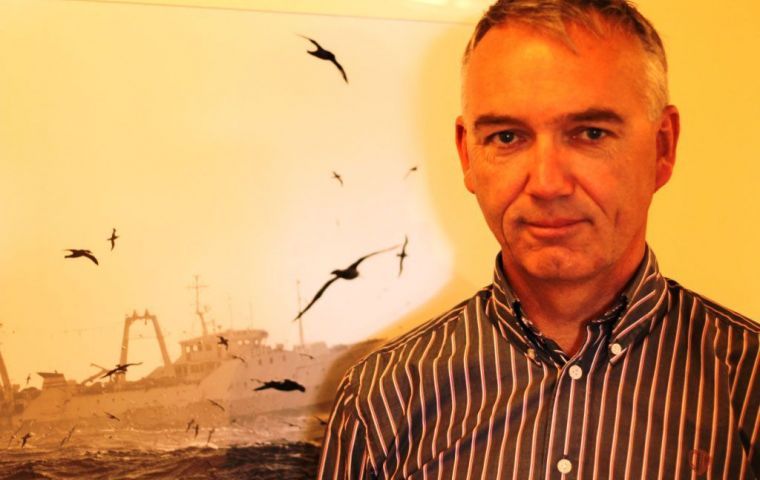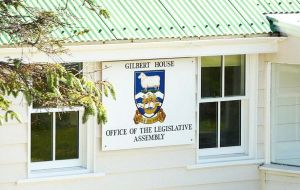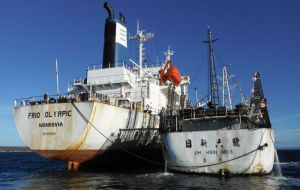MercoPress. South Atlantic News Agency
Falklands fishing license fees frozen for 2017; possible tax policy review
 Director of Natural Resources John Barton recommended increasing 5% only a few license fees
Director of Natural Resources John Barton recommended increasing 5% only a few license fees  Members cited Brexit, investment in new vessels and discussions regarding a new Economic Development Strategy
Members cited Brexit, investment in new vessels and discussions regarding a new Economic Development Strategy  Tax from fishing company was zero when the licensing system was introduced and is now estimated to be up to £4 million annually.
Tax from fishing company was zero when the licensing system was introduced and is now estimated to be up to £4 million annually. The Falkland Islands has decided to hold fee levels across all fishing licenses for 2017 as part of a long term policy focus and in view of certain circumstances emerging from the volatility of annual catches. The Executive Council (ExCo) agreed on the decision by a majority at its last meeting extensive to all license types, including Illex, the Islands main catch.
For the ITQ fisheries this was against the recommendation of the Director of Natural Resources John Barton and other officers who had recommended a 5% increase in fees in each of the Falkland Calamari (D.gahi), Restricted Finfish/Illex (G) and Toothfish-Long line fisheries.
Members cited uncertainty regarding Brexit, investment in new vessels and upcoming discussions regarding a new Economic Development Strategy as being the drivers behind this decision.
The paper addressing Fisheries Access Fees for 2017 was discussed by MLAs Michael Poole, Gavin Short and Ian Hansen after the three ExCo members (MLAs Mike Summers, Jan Cheek and Phyl Rendell) declared an interest in the item.
Falkland Islands Fishing Companies Association (FIFCA) members had urged MLAs to opt for the freeze on licence fees and to look at a longer term strategy aimed at reducing the level of licence fees, based on what was right when Government had only received the license fee, not being right now that there is, “significant localization of the industry, and in particular a substantial amount of tax collected.”
Tax from fishing company was zero when the licensing system was introduced and is now estimated to be up to £4 million annually.
A letter to the Legislative Assembly providing an industry perspective stated that in practice the Loligo licence fee equated to an average of more than 30% of profits.
This meant that the industry was being taxed twice given that the licence fee represents almost one third of profits and is charged even when profits are low or losses are incurred.
The FIG fee target is 10% of sales revenue which takes no account of costs. ExCo did however agreed to increase transshipping fees by 10% in 2017. Transshipment fees only apply to fishing vessels not licensed for Falklands waters and reefer vessels (export license) taking cargo from fishing vessels.
Mr. Barton explained that it was unusual for a licensed fishing vessel to incur a transshipment fee as for the most part their fishing license is endorsed to act as a transshipment license with no further charge.
Transshipment fee revenue varies hugely depending on volume of catches. In the financial year 2014/15 it was £235,950 representing around 160 transshipment licenses, while in the poor Illex year of 2015/16 the transshipment revenue was £3,450 representing just five transshipments. (Penguin News).




Top Comments
Disclaimer & comment rules-

-

-

Read all commentsBut isn't the fishing taking place in Argentinean waters?
Nov 04th, 2016 - 11:56 am +2Chuckle chuckle:
https://www.academia.edu/10574593/Falklands_Islands_Territorial_Waters
Brit Bob,
Nov 04th, 2016 - 06:22 pm +2Oh of course it is. I forgot to mention that. ...and what is it they say about our oil? Oh that's right, that's theirs also. ...oh and to lessen the impact when they realise they'll never win that argument: “there is no oil in commercial quantities in those waters around the islands.”
Chuckle chuckle.
Well anyway, Penguin News has been out long enough now that even Mercopress will have picked up on the issue that's getting everyone excited at the moment down here. It'll give the Malvinistas deadbeats something to play with over the weekend.
Looking like Billy Bob Thornton in that photo John.
Nov 04th, 2016 - 11:27 am 0Sounds like another wise decision by our MLAs. It wasn't inline with Johns Recs in all regards but I can understand their rationale.
Queue Marcos Mike's 10+ year old links to his own discredited articles about overfishing, oil chiefs running FC and guns under his bed.
Commenting for this story is now closed.
If you have a Facebook account, become a fan and comment on our Facebook Page!